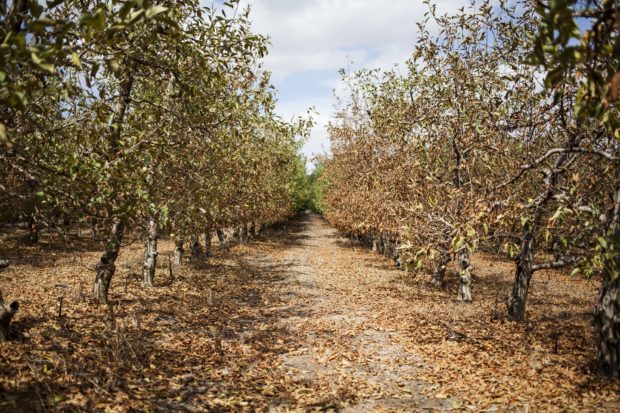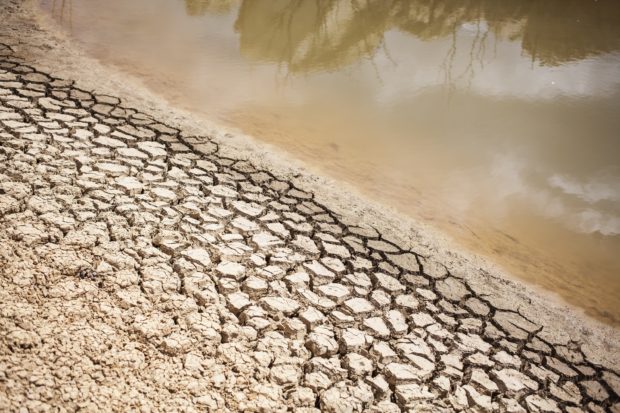Drought-stricken Cape Town counts the cost

Trees in a dried-out fruit orchard are pictured on a farm in Piket Bo-berg, Piketberg, north of Cape Town, on March 7, 2018 as a result of a three-year-long drought. Fruit farmers in the Piket Bo-Berg, who have been struggling with drought for the past three years, had to adapt their ways of farming to still be able to produce a profitable harvest. (AFP PHOTO / WIKUS DE WET)
South African winemaker Marlize Jacobs looks out across the parched brown earth that sustains her award-winning vines, surveying the effects of the water crisis ravaging Cape Town and surrounding areas.
“It’s the strangest thing — I think vines like to suffer. When the berries are shrinking, there’s more concentration of flavors,” she told AFP, describing the impact on her crop of the worst drought in 100 years.
The Western Cape region has gone without significant rains for more than three years, forcing South Africa’s second city to slash residential water consumption by more than 60 percent.
Wine flavors may benefit but water-intensive businesses like Marlize’s farm, 35 kilometers (20 miles) east of Cape Town, have borne the brunt of the water crisis.
“It’s the fourth year in a row that we’re having lower production and there is a shortage of wine,” the 48-year-old Marlize said.
Article continues after this advertisement“Water costs have increased by about 100 percent. We’re absolutely only giving water to keep the vines alive – not any more than that.”
Article continues after this advertisementSo perilous is Cape Town’s economic situation that credit rating agency Moody’s warned in January that if the crisis worsens, it could lead to the city losing its investment-grade status.
Western Cape province said in its economic forecast for 2017 that the growth outlook was “soured… by the persisting drought which also threatens employment”.
The ‘Day Zero’ threat
The city was granted a narrow escape earlier this month when the dreaded “Day Zero” – the date when taps will run dry – was finally pushed back until 2019 after months of growing public panic.
If Day Zero does arrive, individuals will be forced to queue at public standpipes to collect daily 25-liter (6.6 US gallons) rations.
The famed winelands, responsible for 11 percent of the region’s economic output, also bring millions of visitors to the region annually, and the Western Cape tourism sector alone sustains 300,000 jobs.
But tourists have been found to use up to eight times as much water as locals.
The construction industry – another major employer – has not been spared drastic consumption cuts.
Some building projects have had to rely on expensive imported water with others postponed indefinitely because of shortages – in a region where one in ten jobs are in construction.
The Rabie Group, a large construction company, uses treated effluent water to make concrete and wash equipment on its Cape Town sites.
“Obviously these factors all have a price tag which will invariably push up construction prices,” warned Rabie director Miguel Rodrigues.
In 2016, 94 percent of the region’s companies flagged water as a risk to their operations.
Companies have not yet faced a blanket limit, but instead struck agreements with officials – often at huge costs.
“You want to avoid creating the crisis within the crisis… the construction industry is already very fragile, cutting off their water risks creating job losses,” councilor J.P. Smith, who is responsible for safety in the city, told AFP.
The city council is even working with behavioral scientists and the University of Cape Town to determine the best way to “nudge” businesses and residents to slash consumption.

A dried out bank of a nearly water empty dam is pictured on a farm in Piket Bo-berg, Piketberg, north of Cape Town, on March 7, 2018 as a result of a three-year-long drought. Fruit farmers in the Piket Bo-Berg, who have been struggling with drought for the past three years, had to adapt their ways of farming to still be able to produce a profitable harvest. (AFP PHOTO / WIKUS DE WET)
Cutting consumption
Cape Town’s success in cutting domestic consumption – by 60 percent in three years – is expected to be highlighted during World Water Day on March 22.
Christopher Smith, a senior engineering assistant at the Koeberg nuclear power station outside Cape Town, said that the plant has developed its own desalination system in response to the drought.
“I don’t see any option, we just have to bite the bullet,” said Smith, 60, as he stood in line for water at the Newland Spring collection point beside the SAB Miller brewery.
The beer giant, owned by AB InBev, declined to comment on the drought’s effect on beer production, but others in the beverage industry told AFP that if “Day Zero” happened, it would be catastrophic.
“If we run out of water, the whole industry will be mucked up,” said Raphael Clistini, 28, a South African-born entrepreneur who travels the world opening temporary bars.
His most recent venture was the Gin Dock, a pop-up bar that overlooked the city’s famed Victoria and Alfred Waterfront and the iconic Table Mountain.
Clistini serves gin distilled in the city – but the water may soon have to be brought in from Johannesburg, 1,400 kilometers away.
“It’s going to raise the price. Everything is going to cost more,” he said. /kga